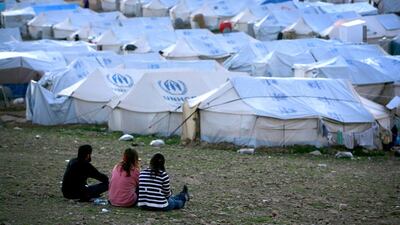ERBIL // Dara had dreams of being a popular oud player in his native Syria.
The Kurd, who escaped Qameshli, a town about 720 kilometres away from Damascus and enrolled in a music school before the almost three-year uprising that sought to unseat the president Bashar Al Assad.
Today, he is serving nargila pipes to customers at a cafe in Erbil, the capital of Iraq’s Kurdish region.
“This isn’t my plan, to work in a cafe,” said Dara. “I’m a foreigner here, but what can I do? I have to work,” he said. “My wish is to play my oud at one of the restaurants here.”
Dara is one of the thousands of Syrian Kurds who have paid to be smuggled out of their war-torn homeland and who now work in the services sector.
Erbil is experiencing a burgeoning of Lebanese restaurants that have introduced Levantine cuisine – shawarma, falafel, hummus. Many Kurds have taken up jobs as chefs and waiters, introducing a touch of Syrian flavour and hospitality. They have also sought work at many of the new cafes and hair salons, while others have bought cars and work as cab drivers night and day.
With the region’s economic growth expected to have reached 8 per cent last year, and bolstered by an estimated 45 billion barrels of oil reserves, Erbil is enjoying an economic boom.
The surge is trickling down to the hospitality sector – as many as 250 hotels opened last year. The growth has spearheaded numerous job opportunities in the sector.
For Syrian Kurds, their talent is scarce: with a strong fluency in Arabic, they are at an advantage over their Iraqi counterparts in catering to the growing number of Lebanese and Arabian Gulf businessmen and professionals who fly into or reside in the city.
Many Iraqi Kurds, and especially the young, are not fluent in Arabic. That is a result of the region’s Kurdisation policies, which date to the early 1990s when a US-enforced no-fly zone loosened the Arab dictator Saddam Hussein’s grip on the region.
“Iraqi Kurds are not interested in working in services. They are mostly interested in business and trade, oil and gas or real estate,” said Mohannad Madi, a Lebanese national who owns the popular Al Afandi restaurant in Erbil. “There’s no calibre or human capital investment for catering to hospitality. I don’t blame them because there’s no schools for tourism.”
The Syrian Kurds are attractive as cheap labour. But this is not their home, and their Iraqi hosts seem to have ambivalent feelings towards their Syrian guests.
As the uprising evolved into a full-scale war in Syria, the Kurdish Regional Government (KRG) in Iraq launched refugee tents in the village of Domiz to host Kurds who came in droves seeking a safe haven.
They were given residency permits, so long as they remained in the camps. Those who leave the camps to find work are defying the rules by so doing.
In July of 2012, KRG’s president, Massoud Barzani, said Kurds fleeing Syria should return home to defend their homeland. Many are still being offered training by the Kurdish rebel forces, the Peshmerga, near the Iraqi village of Duhok.
And according to several Syrian Kurds interviewed, in June 2013 the Erbil government stopped renewing the refugees’ residency permits.
“They’ve stopped giving residency permits here,” says Lana, who works, illegally, as an interpreter at a Turkish company. “There’s people who have been living here and their permits have expired for two years but there’s no enforcement of the law.”
For Lana, like Dara, Iraq’s Kurdish region is a haven, but one with limits that have made their lives as working people difficult.
It is a partial freedom that did not come easily.
Lana paid a smuggler US$600 to escape Syria’s Qameshli for the Iraqi Domiz camp.
She then paid an additional $100 each at a combined value of $400 for her, her husband and two children, for a taxi to smuggle her out of the numerous checkpoints from Domiz to Erbil. By contrast, the price for an ordinary cab ride for the same journey costs 30,000 Iraqi dinar, a little under $30.
“Because of this,” Lana said, “we cannot leave the capital to Domiz for fear that we won’t be allowed to get back into Erbil. The guys at the checkpoints tell us: You want a permit? Go to the camps.”
halsayegh@thenational.ae
Follow us on Twitter @Ind_Insights

